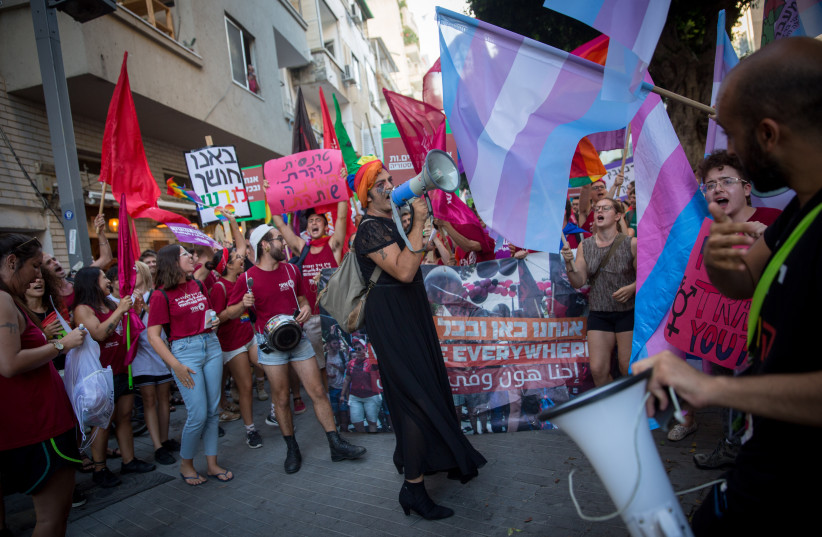An always-present but relatively dormant topic in Israeli elections has gradually come into the limelight, representing a surprising twist in the campaigns: gender.
The stream began with the Likud primary on August 10, when it became apparent that only six women had made it into the top 35 spots. This led to the party being harshly criticized by its opponents. Nonetheless, parties mostly stuck to the “popular” subjects – the high cost of living, personal safety and former prime minister Benjamin Netanyahu.
Then came the episode with the eight-year-old transgender boy in Givat Shmuel.
On August 29, Channel 7 News reported that a number of parents of children in the religious boys’ school, Moreshet Nerya, had discovered a month earlier that one of the students in third grade had been born a girl. The school’s management knew, but kept it a secret.
The issue quickly caught fire. Parents protested in front of the school and refused to send their children. They were joined by MK Michal Waldiger (Religious Zionist Party). Her party leader, MK Bezalel Smotrich, also got involved.

“There is no place in the national religious school system for such confusion of opinions and views that seriously harm the values, natural health and identity of its students,” Smotrich wrote to the Education Ministry. “We must say in a clear voice and without any hesitation that this has no place in our school. No legal hair-splitting can prevail over common sense and natural health.”
Politicians spoke out against the hate
Other parties – especially Meretz and Labor – used the case as an example of everything that was wrong with Smotrich and his party.
“There is no act that is uglier and more disgusting than this,” Labor leader Merav Michaeli said at the Knesset plenum. “To stand in public, to go to the media, to organize demonstrations against the private life of an eight-year-old boy. In the end, we are divided between people who believe in equality for all people, since they were all born in God’s image, and people who are not willing to accept the principle of equality.”
The mayor of Givat Shmuel, Yossi Brodny, who became Interior Minister Ayelet Shaked’s No. 2 in Habayit Hayehudi, also spoke out in the boy’s defense.
In fact, the episode unfolded as Shaked hashed out her merger with Brodny. Then, with polls showing the party falling far beneath the electoral threshold, Shaked found a new gender-related campaign banner. She began to stress at every opportunity that she is the only woman in history to lead a right-wing party, and that the party had three women in its top six spots. She emphasized that this is far more than all of the other parties in the right-wing bloc – there is one woman in the top 10 in the Likud, RZP has two, and Shas and UTJ, of course, have zero.
Then, on September 14, RZP added MK Avi Maoz from the ultra-conservative Noam party onto its list. Maoz staunchly opposes any form of gender fluidity or LGBT rights. He also opposes legislation that promotes gender equality, and said last year that “the best contribution for a woman is to get married and raise a family.”
Meretz and Labor once again attacked him for these positions, and Yesh Atid jumped on board on Tuesday with an unusual video rife with cynicism.
The party published the video as a “response to the ‘Otzma Gavrit’ (Male Power) party,” a play on words for MK Itamar Ben-Gvir’s Otzma Yehudit (Jewish Power) party.
“We in the Male Power party promise to decide everything for you [women] on every subject – the economy, security, even your own body, if you will be able to decide over your body or not, like in America,” a male voice says, as a number of stereotypical “alpha males” flash across the screen.
“We will organize an exemption from the IDF, because what do you have to do with that? We will make sure you earn as much as a man who works a woman’s job. The Male Power party – our power to decide for you [women],” the video continued.
It then shifts to a woman’s voice. “Haven’t you had enough of parties that violate your rights? Yesh Atid promises to continue placing women in decision-making roles and promote women’s rights in Israel,” the video concluded, with seven female members on the Yesh Atid list, three of whom are currently ministers, sitting and standing with their arms folded.
RZP responded shortly afterwards with a video of its own. “[Prime Minister Yair] Lapid, do you really want to talk about respecting women?” it asks. It then shows a short clip of Lapid making a sexist joke at the expense of Economy Minister Orna Barbivay.
Meretz, Labor, RZP, Yesh Atid and Habayit Hayehudi are talking about gender roles, and the video battles show that the issue has crept into the limelight. The Left has a case to make here, and maybe a few points to score – the lack of women on the Right is embarrassing, and some of its (male) members hold views that would have been considered conservative 50 years ago.
